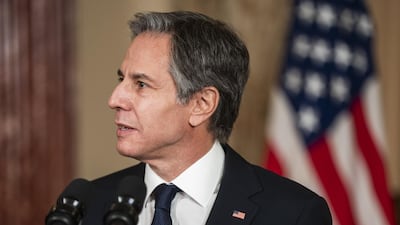US Secretary of State Antony Blinken raised the issues of China's treatment of Uighurs, Tibetans and Hong Kong in the first conversation between top officials of the two powers since President Joe Biden took office.
"I made clear the US will defend our national interests, stand up for our democratic values, and hold Beijing accountable for its abuses of the international system," Mr Blinken said on Twitter after his call with senior Chinese official Yang Jiechi on Friday.
The State Department said Mr Blinken told Mr Yang that the United States "will continue to stand up for human rights and democratic values, including in Xinjiang, Tibet and Hong Kong".
He also "pressed China to join the international community in condemning the military coup in Burma", it said, using the former name of Myanmar.
Mr Blinken said the US would hold Beijing "accountable for its efforts to threaten stability in the Indo-Pacific, including across the Taiwan Strait, and its undermining of the rules-based international system".
Mr Blinken said at his confirmation hearing that he would continue former president Donald Trump's approach to China in a rare point of agreement between the two administrations.
Mr Yang told Mr Blinken that Hong Kong, Xinjiang and Tibet were "China's internal affairs" and "no external forces are allowed to interfere", while urging the US to "correct mistakes" made in recent years, the Chinese embassy to the US said.
He also called on Washington to "strictly abide by the one China principle" under which Beijing considers Taiwan an inseparable part of its territory, saying "the Taiwan issue is the most important and sensitive core issue in China-US relations".
Mr Blinken has said he agrees with a determination by the State Department under Mr Trump that Beijing is carrying out genocide in the western region of Xinjiang, where rights groups say more than one million Uighurs and other mostly Muslim Turkic-speaking people have been rounded up in camps.
Beijing has also ramped up a crackdown in Hong Kong, arresting leading activists, after imposing a new law against subversion following major protests in the financial hub to which it had guaranteed a separate system.
Mr Biden nonetheless offered a small olive branch during a speech on foreign policy on Thursday, saying that while the United states will "confront" China, "We are ready to work with Beijing when it's in America's interest to do so."
Mr Blinken has spoken of climate change as an area of co-operation as China and the United States are the two largest emitters of greenhouse gases.
Beijing has long enjoyed a privileged relationship with Myanmar, supporting the junta that gave way to democracy a decade ago with US support.
The military in the South-east Asian nation this week carried out a coup, arresting civilian leader Aung San Suu Kyi, in what Chinese state media described as "a major cabinet reshuffle".
Mr Biden, who has vowed to promote democracy worldwide after Mr Trump's flirtations with autocratic leaders, condemned the coup and threatened sanctions if the military did not relinquish power.

